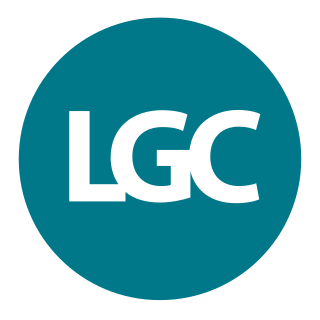The Merck Group, branded and commonly known as Merck, is a German multinational science and technology company headquartered in Darmstadt, with about 60,000 employees and a presence in 66 countries. The group includes around 250 companies; the main company is Merck KGaA in Germany. The company is divided into three business lines: Healthcare, Life Sciences and Electronics. Merck was founded in 1668 and is the world's oldest operating chemical and pharmaceutical company, as well as one of the largest pharmaceutical companies globally.
Sigma-Aldrich is an American chemical, life science, and biotechnology company owned by the multinational chemical conglomerate Merck Group.

Product certification or product qualification is the process of certifying that a certain product has passed performance tests and quality assurance tests, and meets qualification criteria stipulated in contracts, regulations, or specifications.
ISO/IEC 17025General requirements for the competence of testing and calibration laboratories is the main standard used by testing and calibration laboratories. In most countries, ISO/IEC 17025 is the standard for which most labs must hold accreditation in order to be deemed technically competent. In many cases, suppliers and regulatory authorities will not accept test or calibration results from a lab that is not accredited. Originally known as ISO/IEC Guide 25, ISO/IEC 17025 was initially issued by ISO/IEC in 1999. There are many commonalities with the ISO 9000 standard, but ISO/IEC 17025 is more specific in requirements for competence and applies directly to those organizations that produce testing and calibration results and is based on more technical principles. Laboratories use ISO/IEC 17025 to implement a quality system aimed at improving their ability to consistently produce valid results. Material in the standard also forms the basis for accreditation from an accreditation body.
Public Analysts are scientists in the British Isles whose principal task is to ensure the safety and correct description of food by testing for compliance with legislation. Most Public Analysts are also Agricultural Analysts who carry out similar work on animal feedingstuffs and fertilisers. Nowadays this includes checking that the food labelling is accurate. They also test drinking water, and may carry out chemical and biological tests on other consumer products. While much of the work is done by other scientists and technicians in the laboratory, the Public Analyst has legal responsibility for the accuracy of the work and the validity of any opinion expressed on the results reported. There is an Association of Public Analysts, which includes members with similar roles if different titles in other countries.

LGC Group, formerly the Laboratory of the Government Chemist, is an international life sciences measurement and tools company. It provides the role and duties of the UK Government Chemist, a statutory adviser to the government. LGC also hosts the UK's National Measurement Laboratory (NML) for chemical and bio-measurement, which performs measurements for diagnostics, advanced therapeutics, safety and security, among others.

Certified reference materials (CRMs) are 'controls' or standards used to check the quality and metrological traceability of products, to validate analytical measurement methods, or for the calibration of instruments. A certified reference material is a particular form of measurement standard.

The British Standards Institution (BSI) is the national standards body of the United Kingdom. BSI produces technical standards on a wide range of products and services and also supplies certification and standards-related services to businesses.
The South African National Accreditation System (SANAS) is the official accreditation body for South Africa. Founded in 1996, SANAS is headquartered in Pretoria, South Africa. SANAS accreditation certificates are a formal recognition by the Government of South Africa that an organisation is competent to perform specific tasks.
Verification and validation are independent procedures that are used together for checking that a product, service, or system meets requirements and specifications and that it fulfills its intended purpose. These are critical components of a quality management system such as ISO 9000. The words "verification" and "validation" are sometimes preceded with "independent", indicating that the verification and validation is to be performed by a disinterested third party. "Integration verification and validation" can be abbreviated as "IV&V".
Insulated shipping containers are a type of packaging used to ship temperature sensitive products such as foods, pharmaceuticals, organs, blood, biologic materials, vaccines and chemicals. They are used as part of a cold chain to help maintain product freshness and efficacy. The term can also refer to insulated intermodal containers or insulated swap bodies.

Norcocaine is a minor metabolite of cocaine. It is the only confirmed pharmacologically active metabolite of cocaine, although salicylmethylecgonine is also speculated to be an active metabolite. The local anesthetic potential of norcocaine has been shown to be higher than that of cocaine, however cocaine continues to be more widely used. Norcocaine used for research purposes is typically synthesized from cocaine. Several methods for the synthesis have been described.
A specification often refers to a set of documented requirements to be satisfied by a material, design, product, or service. A specification is often a type of technical standard.

National Accreditation Board for Testing and Calibration Laboratories (NABL) provides accreditation to Conformity Assessment Bodies (Laboratories) in India. NABL Schemes include Accreditation (Recognition) of Technical competence of testing, calibration, medical testing laboratories, Proficiency testing providers (PTP) & Reference Material Producers (RMP) for a specific scope following ISO/IEC 17025, ISO 15189, ISO/IEC 17043 & ISO 17034:2016 Standards. It has Mutual Recognition Arrangement (MRA) with Asia Pacific Accreditation Cooperation (APAC), International Laboratory Accreditation Cooperation (ILAC).
IEC 62443 is an international series of standards that address cybersecurity for operational technology in automation and control systems. The standard is divided into different sections and describes both technical and process-related aspects of automation and control systems cybersecurity.

The Korea Testing & Research Institute, abbreviated as KTR, is a testing and certification institute in South Korea which performs integrate testing, certification, and technical consulting for all fields of the industry.
Canadian Reference Materials (CRM) are certified reference materials of high-quality and reliability produced by the National Metrology Institute of Canada – the National Research Council Canada. The NRC Certified Reference Materials program is operated by the Measurement Science and Standards portfolio and provides CRMs for environmental, biotoxin, food, nutritional supplement, and stable isotope analysis. The program was established in 1976 to produce CRMs for inorganic and organic marine environmental analysis and remains internationally recognized producer of CRMs.
GFS Chemicals Inc, formerly known as G. Frederick Smith Chemical Company, is a privately owned fine and specialty chemical company with headquarters in Powell, Ohio and manufacturing facilities in Columbus, Ohio. It was founded by G. Frederick Smith in Urbana, Illinois in 1924, and moved to Columbus, Ohio in 1928.
The National Association of Testing Authorities (NATA) is the recognised national accreditation authority for analytical laboratories and testing service providers in Australia. It is an independent, not-for-profit organisation, governed by a board of directors that has representation from NATA members, industry, government and professional bodies.
The National Dope Testing Laboratory (NDTL) is a premier analytical testing & research organization established as an autonomous body under the Ministry of Youth Affairs and Sports, Government of India. It is the only laboratory in the country responsible for human sports dope testing. It is headed by Chief Executive Officer (CEO). Dr. Puran Lal Sahu is the Scientific Director of NDTL.







